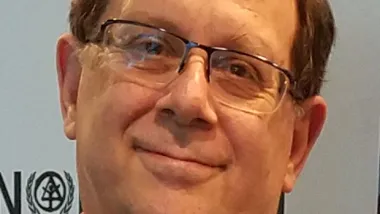As part of Human Settlements Day at COP-23 on November 11, Planners for Climate Action will feature representatives of professional planners associations and planning school associations worldwide.

Planners for Climate Action will launch at COP-23 in Bonn as a stakeholder group under the Marrakesh Partnership in the UN Framework Convention on Climate Change (UNFCCC). Planners for Climate Action will be part of Human Settlements Day on November 11 at COP-23, beginning at 11:30 am in the Davos Room, Bonn Zone.
Cities emit a significant portion of the world's greenhouse gases while providing homes to concentrated populations that are highly vulnerable to the impacts of climate change. Over the past decade or so, sub-national governments have been rising in visibility in the UN climate discussions. At the 2014 Ban Ki-moon Climate Summit several new stakeholder groups reflecting government perspectives were added. The 2015 Paris Agreement explicitly mentions "cities and subnational authorities" as one type of non-Party stakeholder that is invited to "scale up" its efforts.
Urban and regional planners have a key role to play in helping cities address climate change. Compact urban development patterns may make public transportation more viable, leading to reduced greenhouse gas emissions; meanwhile in the long-term land use controls will profoundly affect the exposure of vulnerable populations to climate-related natural hazards such as flooding and landslides. The role of city and regional planners and plans in addressing climate change is made explicit in the 2030 Agenda for Sustainable Development as well as in the New Urban Agenda. Despite this, city planners and their organizations have been outside the purview of the UNFCCC Marrakesh Partnership. This step forward will be important for our profession and our schools, and to the degree that we have substance to offer that others do not, for the global climate change process.
The launch will feature UN-Habitat Executive Director Joan Clos, and Hakima El Haite, special envoy for climate change, Kingdom of Morocco; and Imia Seruiratu, minister for agriculture, minister for rural and maritime development and national disaster management, Government of Fiji; high-level champion, Marrakesh Partnership for Global Climate Action.
There will be two planners roundtables. One, moderated by Shipra Narang Suri, coordinator of UN-Habitat's Urban Planning and Design Branch, will bring representatives of professional planners organizations together, including Didier Vancutsem, secretary general, International Society of City and Regional Planners (ISOCARP), Clive Harridge, secretary general, Commonwealth Association of Planners (CAP), Jeff Soule, director of outreach and international programs, American Planning Association (APA), and Shi Nan, secretary general, Urban Planning Society of China (UPSC).
The second roundtable, organized by Global Planning Education Association Network (GPEAN) and moderated by me, will include Divya Leducq, associate professor in Urban and Regional Planning, Polytechnic College of the University of Tours (France); Association for the Development of Planning Education and Research (APERAU); Shuaib Lwasa, associate professor, Department of Geography, Makerere University, Uganda; Association of African Planning Schools (AAPS); Benjamin Davy, professor of Land Policy, Land Management, Municipal Geoinformation, TU Dortmund University (Germany); vice president, Association of European Schools of Planning (AESOP); Azime Tezer, professor of Urban and Regional Planning, Istanbul Technical University, Turkey; Association of Planning Schools of Turkey (TUPOB); Ricardo Villasis-Keever, faculty member, Universidad Autónoma de San Luis Potosí, Mexico; Asociación Latinoamericana de Escuelas de Urbanismo y Planificación (ALEUP); and Barbara Norman, foundation chair of Urban and Regional Planning, University of Canberra, Australia, Australia and New Zealand Association of Planning Schools (ANZAPS)
There will also be a meeting of planners' association and planning school association representatives with UN officials at COP-23 to lay out the working plans for the new stakeholder group. The US Association of Collegiate Schools of Planning will be represented at this meeting by Michael Boswell of California Polytechnic, San Luis Obispo.

Planetizen Federal Action Tracker
A weekly monitor of how Trump’s orders and actions are impacting planners and planning in America.

Chicago’s Ghost Rails
Just beneath the surface of the modern city lie the remnants of its expansive early 20th-century streetcar system.

Amtrak Cutting Jobs, Funding to High-Speed Rail
The agency plans to cut 10 percent of its workforce and has confirmed it will not fund new high-speed rail projects.

Ohio Forces Data Centers to Prepay for Power
Utilities are calling on states to hold data center operators responsible for new energy demands to prevent leaving consumers on the hook for their bills.

MARTA CEO Steps Down Amid Citizenship Concerns
MARTA’s board announced Thursday that its chief, who is from Canada, is resigning due to questions about his immigration status.

Silicon Valley ‘Bike Superhighway’ Awarded $14M State Grant
A Caltrans grant brings the 10-mile Central Bikeway project connecting Santa Clara and East San Jose closer to fruition.
Urban Design for Planners 1: Software Tools
This six-course series explores essential urban design concepts using open source software and equips planners with the tools they need to participate fully in the urban design process.
Planning for Universal Design
Learn the tools for implementing Universal Design in planning regulations.
Caltrans
City of Fort Worth
Mpact (founded as Rail~Volution)
City of Camden Redevelopment Agency
City of Astoria
City of Portland
City of Laramie






























